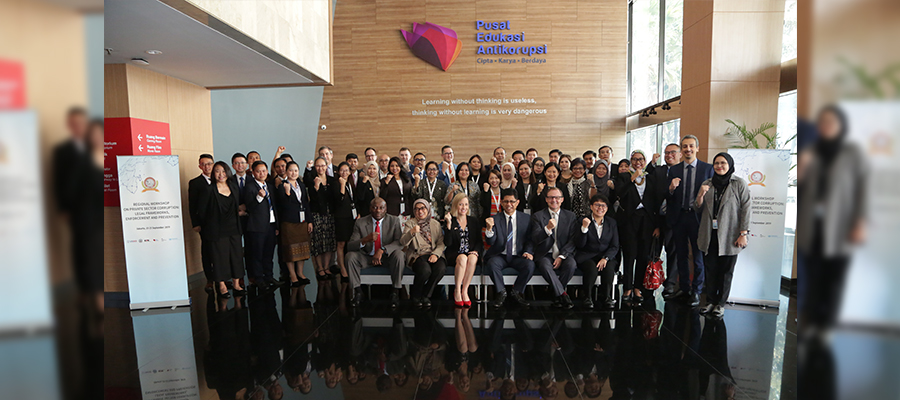During the Secretariat Meeting in Manila in 2018, the Corruption Eradication Commission (KPK) suggested a capacity building program to promote and improve collaboration between members of the South East Asia Parties Against Corruption (SEA-PAC) in preventing and eradicating corruption.
Coordinator of KPK’s Anticorruption Learning Center (ACLC), Dian Novianthi, said that five country members of SEA-PAC reported a similar challenge they faced, namely bribery in private sector.
“Issues like bribery in private sector have not been declared as violation or corruption,” said Dian in her speech during the Regional Workshop on Private Sector Corruption, at the ACLC building, Monday (Sept. 23).
Moreover, Dian also said that the country has yet to issue a regulation on embezzlement, bribery, accepting bribery, and facilitating bribery in private sector. Anticorruption institutions in several countries are not sufficiently equipped with the expertise in gathering evidence and investigate corruption in private sectors, she said.
Rob Fen, the United Kingdom Deputy Head of Mission to Indonesia and Timor Leste, said corruption creates unhealthy business climate. He praised the workshop for providing a venue to share experience to improve the capacity of SEA-PAC members in fighting corruption in private sector.
“The workshop aimed to improve the understanding about effective regulation to snatch bribers in private sector,” he said.
He added that the workshop also aimed to increase the understanding on the regulation framework on beneficial ownership’s transparency and implementation, and on the standard or performance to prevent corruption in private sector by improving corporate governance and compliance against bribery.
During the same workshop, Charge d’Affaires of the United States Mission to the Association of Southeast Asian Nation (ASEAN), Melissa A. Brown, said she urged the increased transparency of beneficial ownership as the strategy to prevent corruption in private sector. In 2016, the US was the first G20 country to introduce beneficial ownership.
“The information reveals the real owner of companies,” Brown said.
She said that she hoped experts and corruption watchdog representatives from eight ASEAN countries coming to the meeting could share experience and expand their knowledge on private sector corruption.
“Upon returning to your country, you can find a way to solve the challenge in eradicating private sector corruption,” Brown said.
KPK Deputy Chair Laode M. Syarif said KPK was really grateful with the meeting. Such collaboration, he said, serves as a reminder that every anticorruption institution has allies in other countries that are ready to help.
“It’s always a pleasure to have friends like you visit us, fellow fighters against corruption,” said Laode, who explained about KPK’s efforts in eradicating private sector corruption, including Profit, Professional with Integrity program.
The three-day workshop will end on Sept. 25. Aside from KPK, eight members of SEA-PAC were also present, including the Malaysian Anti-Corruption Commission (MACC), Corrupt Practices Investigation Bureau (CPIB) of Singapore, and Anti-Corruption Commission of Myanmar.


